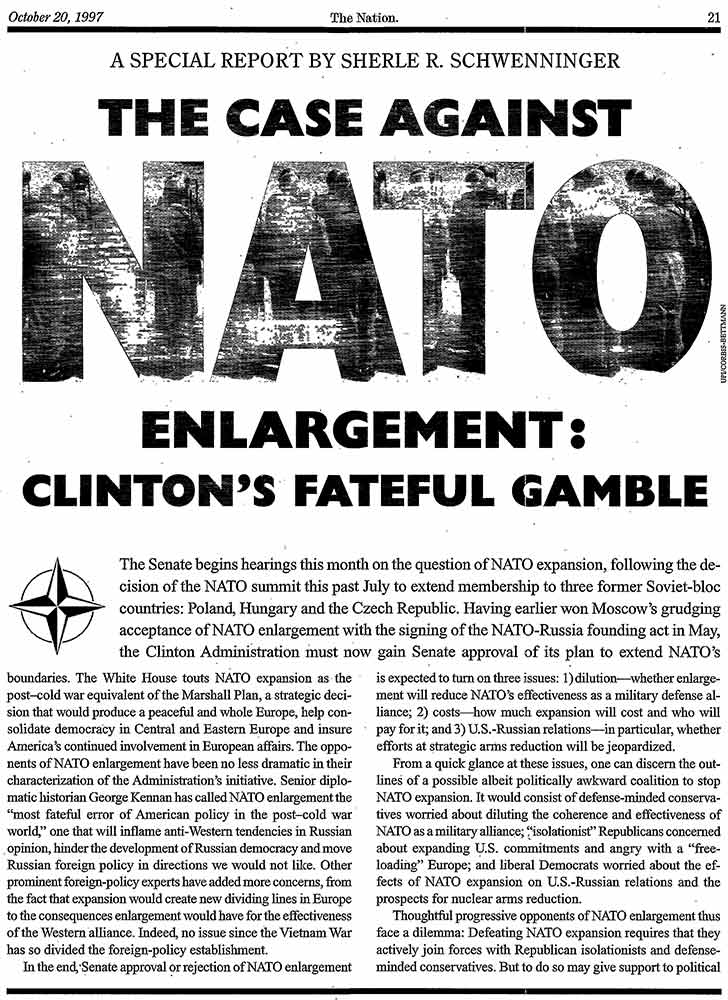NATO and The Nation
Unhappy Birthday: NATO Is 75 Years Old Today
The Cold War alliance long ago outlived its usefulness. But then Nation contributors have been skeptical since the beginning.

The 75th anniversary of the North Atlantic Treaty Organization (NATO) offers a chance to reflect on the pact’s Cold War origins, checkered history, and uncertain future. Created in 1949 to formalize American security guarantees in Western Europe, NATO immediately signaled its intention to expand beyond the North Atlantic region designated in its name. Almost as quickly, The Nation expressed skepticism about this plan. In 1951, we objected to the idea of adding Turkey and Greece to the alliance. Bringing those countries in would “effectually end the concept of a democratic union in defense of the ‘free world,’” the magazine argued. “What we are constructing instead, with breathtaking speed, is an old-fashioned military alliance equipped with ‘fantastic’ new-fashioned weapons.”
A year later, one of The Nation’s regular correspondents on foreign affairs, the Spanish writer and socialist politician Julio Àlvarez del Vayo, voiced more concerns. Support for the internationalist vision behind the United Nations was being supplanted by NATO’s more militaristic approach, Àlvarez del Vayo wrote. “The attempt should be exposed for the sake of the millions of people here and abroad who still take seriously the democratic slogans enunciated during the war.”
NATO was founded to address a specific historical moment, but its strategic purpose since that moment passed has never been entirely clear. On the group’s 10th anniversary, in 1959, the English historian Geoffrey Barraclough wrote in these pages that NATO’s future was in doubt. “Even its warmest upholders are conscious of its shortcomings,” Barraclough observed. “World conditions have changed in fundamental ways since NATO was formed in 1949”—notably, with Joseph Stalin’s death—“but the organization has not changed with them.”
In 1995, when Washington’s foreign-policy “Blob” seized on the end of the Cold War as an opportunity to expand rather than wind down the pact, Nation writers warned—loudly and often—that such a step would only make everyone less secure. “A revival of East-West conflict along the lines of the Cold War is hardly inevitable,” Matthew Evangelista wrote. “But few geopolitical decisions would encourage it more than expansion of NATO into Eastern Europe. If the Clinton administration insists on enlarging NATO, it runs a serious risk of rupturing relations with Moscow, a break that could be disastrous at a time when democratic reformers in Russia already face the distinct possibility of being overwhelmed by the forces of the past.”
Two years later, Sherle Schwenninger laid out “The Case Against NATO Enlargement.” Expanding NATO, he warned, would set back nuclear disarmament efforts and hinder reconciliation. Given that Russia was not consulted in the decision to swell NATO right up to its borders, Schwenninger noted in one haunting passage, “Russian nationalists could reasonably ask…why should Moscow allow the United States to have a say in areas bordering Russia and in its sphere of influence?”
Disobey authoritarians, support The Nation
Over the past year you’ve read Nation writers like Elie Mystal, Kaveh Akbar, John Nichols, Joan Walsh, Bryce Covert, Dave Zirin, Jeet Heer, Michael T. Klare, Katha Pollitt, Amy Littlefield, Gregg Gonsalves, and Sasha Abramsky take on the Trump family’s corruption, set the record straight about Robert F. Kennedy Jr.’s catastrophic Make America Healthy Again movement, survey the fallout and human cost of the DOGE wrecking ball, anticipate the Supreme Court’s dangerous antidemocratic rulings, and amplify successful tactics of resistance on the streets and in Congress.
We publish these stories because when members of our communities are being abducted, household debt is climbing, and AI data centers are causing water and electricity shortages, we have a duty as journalists to do all we can to inform the public.
In 2026, our aim is to do more than ever before—but we need your support to make that happen.
Through December 31, a generous donor will match all donations up to $75,000. That means that your contribution will be doubled, dollar for dollar. If we hit the full match, we’ll be starting 2026 with $150,000 to invest in the stories that impact real people’s lives—the kinds of stories that billionaire-owned, corporate-backed outlets aren’t covering.
With your support, our team will publish major stories that the president and his allies won’t want you to read. We’ll cover the emerging military-tech industrial complex and matters of war, peace, and surveillance, as well as the affordability crisis, hunger, housing, healthcare, the environment, attacks on reproductive rights, and much more. At the same time, we’ll imagine alternatives to Trumpian rule and uplift efforts to create a better world, here and now.
While your gift has twice the impact, I’m asking you to support The Nation with a donation today. You’ll empower the journalists, editors, and fact-checkers best equipped to hold this authoritarian administration to account.
I hope you won’t miss this moment—donate to The Nation today.
Onward,
Katrina vanden Heuvel
Editor and publisher, The Nation








